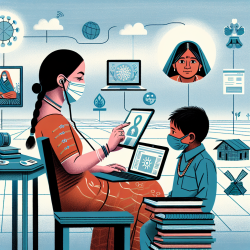Acute bacterial meningitis is a severe condition that can have long-lasting effects not only on the children who survive it but also on their families. A recent study titled Familial experience of acute bacterial meningitis in children: a transversal qualitative study using interpretative phenomenological analysis provides critical insights into the subjective experiences of close family members. These findings offer valuable lessons for practitioners aiming to improve their care strategies and encourage further research.
Key Findings and Their Implications
The study identified six major themes that characterize the familial experience of acute bacterial meningitis:
- Meningitis disease
- Healthcare services and professionals
- Knowledge/ignorance
- Repercussions of the meningitis experience: ‘life afterwards’
- Sick child attitudes/behaviour
- Sibling attitudes/behaviour
Healthcare Services and Professionals
One significant theme is the interaction between families and healthcare providers. Families expressed mixed experiences, ranging from high praise for life-saving actions to frustration over poor communication and lack of psychological support. For practitioners, this underscores the importance of clear, empathetic communication and the provision of psychological support not just for the patient but for the entire family.
Knowledge and Ignorance
Another critical finding is the gap in knowledge about the disease among both families and healthcare providers. Many families felt unprepared and overwhelmed due to insufficient information. Practitioners can address this by ensuring that families receive comprehensive, understandable information about the disease, its progression, and potential outcomes.
Repercussions of the Meningitis Experience
The study highlights the long-term physical and psychological impacts on the affected children and their families. Practitioners should consider long-term follow-up care that includes psychological support for both the child and their family members. This approach can help in managing the emotional and psychological toll of the disease.
Encouraging Further Research
The study also points to areas that require further investigation. For instance, the psychological adjustment of siblings and the role they play in the recovery process of the affected child is an area ripe for more research. Understanding these dynamics can help in designing better support systems for the entire family.
Practical Recommendations
Based on the study's findings, here are some practical recommendations for practitioners:
- Improve communication strategies to ensure families are well-informed and feel supported.
- Provide psychological support for both the patient and their family members, especially during critical care and long-term recovery phases.
- Engage in continuous professional development to stay updated on best practices for managing bacterial meningitis and its repercussions.
- Consider the inclusion of family members in the care process to better address their emotional and psychological needs.
By implementing these recommendations, practitioners can significantly improve the quality of care provided to children with acute bacterial meningitis and their families.
To read the original research paper, please follow this link: Familial experience of acute bacterial meningitis in children: a transversal qualitative study using interpretative phenomenological analysis.










